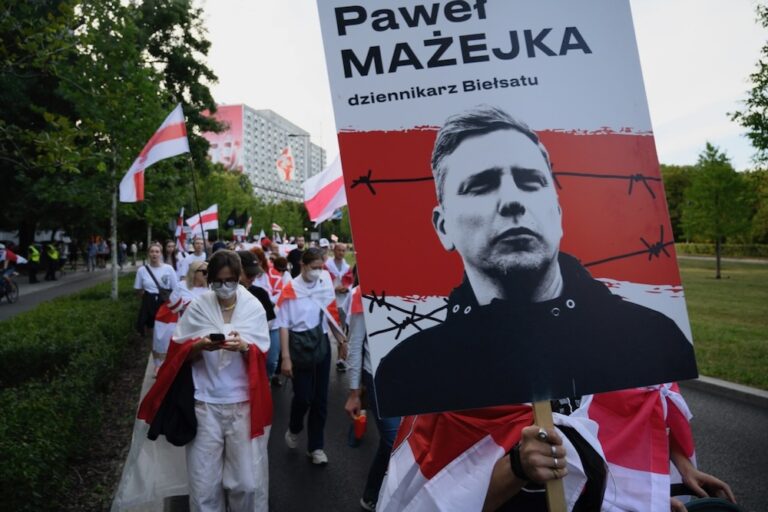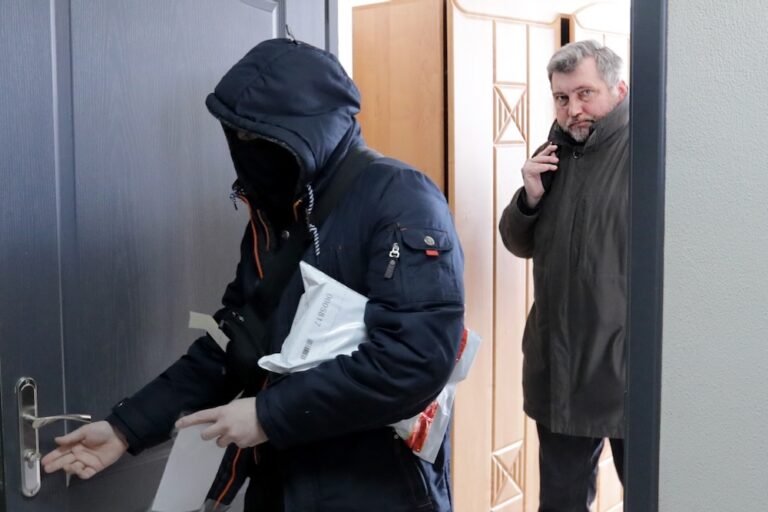(HRW/IFEX) – Human Rights Watch reports that Yuri Khashchevatsky, an internationally renowned film director and member of the Belarusian Helsinki Committee who recently became a member of the pro-democracy movement “Charter ’97”, has been severely beaten. On the night of 23 December 1997, two unidentified men broke into Khashchevatsky’s film studio and beat him unconscious, […]
(HRW/IFEX) – Human Rights Watch reports that Yuri Khashchevatsky, an
internationally renowned film director and member of the Belarusian Helsinki
Committee who recently became a member of the pro-democracy movement
“Charter ’97”, has been severely beaten. On the night of 23 December 1997,
two unidentified men broke into Khashchevatsky’s film studio and beat him
unconscious, breaking his nose, breaking his foot in three places, and
causing him a concussion and multiple bruises and abrasions. No valuables
or equipment were stolen or damaged, strongly indicating the intimidatory
nature of the assault.
In November 1996, Khashchevatsky had completed a documentary film entitled
“An Ordinary President,” which is openly critical of the Belarusian
president Alexander Lukashenka. The film drew international acclaim and, in
1997, was awarded a prize from the Berlin Film Festival and the prestigious
Russian Sakharov Prize. However, in Belarus, the film’s reception was
markedly different.
On the night of 22 January 1997, a local cable television station in the
town of Karelichi, in Grodno region, broadcast the film. The local police
and the State Security Committee (KGB) arrived at the station just as the
film was ending, broke down the door, confiscated the film and arrested
nineteen-year-old Maksim Svyrid, the video operator at the station who had
broadcast the film. Svyrid was held until 1:00 a.m. and ordered to report
to the KGB the next day whereupon, after questioning, he was released. On
19 November 1997, Belarusian Video Center director Sergei Lukyanchikov fired
resident engineer, Viktor Chernomorets, and fined the Center’s chief
engineer, Vladimir Tomashevsky, for reportedly having made a copy of the
film. As a result of this intimidation, “An Ordinary President” is
effectively banned from public veiwing in Belarus.
On 21 December, just two days before the assault on Khashchevatsky, “An
Ordinary President” was shown on the French/German channel ARTE. Although
this channel is not received in Belarus, Human Rights Watch believes that
there is a direct correlation between the timing of the assault and the
broadcasting of the film. In addition, Khashchevatsky’s political
affiliations may well have contributed to the attackers’ motives, which
appear overwhelmingly to have been to intimidate Khashchevatsky and deter
him from future political activity or film-making.
Recommended Action
Send appeals to the president:
justice those complicit in previous assaults on human rights activists and
journalists who oppose or are perceived to threaten the administration and
expressing concern that this failure suggests, at a minimum, that the
administration approves of or condones these assaults
may bear no result
and make public its
findings; to publicly denounce the assault on Khashchevatsky; and to permit
the showing of “An Ordinary President” without reprisal throughout Belarus.
Appeals To
President Alexander Lukashenka
Presidential Office
Minsk 220010
Republic of Belarus
Fax: +172 26 06 10
Please copy appeals to the source if possible.


